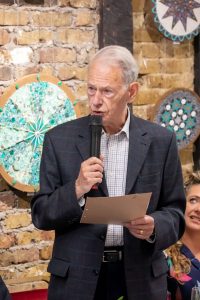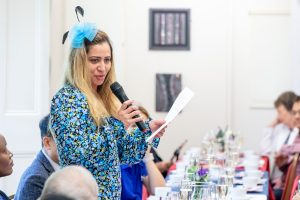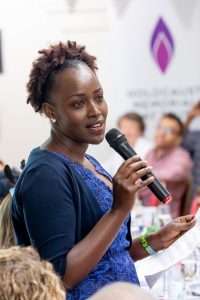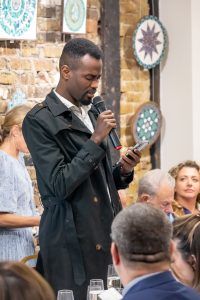HMDT Blog: Survivors reflect on the Queen’s Platinum Jubilee
We hear from survivors of the Holocaust and recent genocides about what Her Majesty the Queen’s Platinum Jubilee means to them as former refugees to the UK.

To celebrate the lives that survivors have built in the UK during Her Majesty’s reign, we hosted a special tea party in London.
For many survivors, the Queen is a symbol of the warm welcome they have found in the UK. Here is a collection of reflections from survivors who attended our tea party.

John Hajdu MBE
John Hajdu MBE, survivor of the Holocaust:
I arrived in this country wearing clothes donated to me, speaking very little English, and knowing absolutely nobody.
But Britain gave me a home. Britain gave me hope.My life has been rich and rewarding. I stand before you here today as a proud father of two, and I have four lovely grandchildren.
Ivor Perl BEM, survivor of the Holocaust:
When you mention the Queen, my mind goes back to a time in the 1960s when the national anthem used to be played in cinemas. I always looked forward to hearing God Save the Queen and was a bit upset when cinemas stopped playing it!
When I arrived in Britain in 1945, it felt like heaven! I just couldn’t understand how people could be so nice.

Daniela Abraham
Daniela Abraham, second generation survivor of the Roma genocide:
I absolutely adore the Queen. It was such an honour for me to meet and speak with members of the Royal Family – the Duke and Duchess of Cambridge – at a Holocaust Memorial Day event in 2020.
To me, Her Majesty the Queen represents the country that gave my family hope and the freedom to be who we are. For that, I will forever be grateful.
Sokphal Din BEM, survivor of the genocide in Cambodia:
I’m forever grateful that Her Majesty’s government gave us permission to come to the UK in the summer of 1987. My late mother loved both the Queen Mother and her Majesty the Queen. We have Her Majesty’s picture in our living room.
My mother always told us that she prayed for the Queen every night before going to bed. That’s because Britain gave us the opportunity to rebuild our lives.

Antoinette Mutabazi
Antoinette Mutabazi, survivor of the genocide against the Tutsi in Rwanda:
Growing up, I honestly had no idea about Britain or the Royal Family – even though Rwanda itself was ruled by a monarch before the colonial era.
It was only when I arrived in Britain in 2000s that I became aware of Her Majesty and the special place she has in many people’s hearts.
I’m proud to call this country my home. I have felt welcome from the first day I arrived and am thankful for the opportunity to rebuild my life here.
Smajo Bešo, survivor of the genocide in Bosnia:
As a child, the idea of kings and queens in a faraway land had always fascinated me. I would flick through books and look at old royal photos, closely examining them for hours – particularly the kings and queens of Great Britain.
It was something that I associated with a far away and magical land – an abstract concept. But never did I imagine that one day I would call this land home.

El Sadiq Manees
El Sadiq Manees, survivor of the genocide in Darfur:
As a little boy, I always knew that England was a country of queens and kings. But I really didn’t know anything about Her Majesty The Queen. Not many people in Darfur do.
For me, The Queen represents all that is good about Britain. It’s a country that has made such a positive difference to the lives of so many refugees and asylum seekers.


